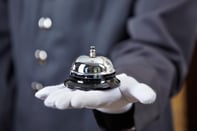Published on
Three Lessons Higher Education Leaders Can Learn From Hospitality Management

Lesson 1: The Sense of Urgency
Perhaps the greatest takeaway is the tremendous sense of urgency that individuals working in restaurants and hotels possess. There are enormous pressures in those kinds of operations that most people don’t think about. For example, there’s a whole world of urgencies around perishables. Food and beverage items must be used by a certain date or they are wasted. Sometimes the window of time is extremely short. If the stock isn’t rotated properly, the new items are used while the older items remain behind on the shelf. In that world there’s an incredible urgency to meet payroll and pay the vendors in a timely basis; it’s a real, tangible financial set of pressures. Time also functions differently in those fast-paced environments. There’s no wiggle room when hungry customers show up for a 5 pm dinner service—you must be ready.
I bring this up not because students are the same as customers—absolutely not. What I found in my first experience in a college setting was extremely eye-opening: People moved more slowly and I found myself somewhat frustrated by the lack of urgency I observed. I would argue that we need to work with the same sort of urgency about the services we are providing that I saw people working with in hospitality. For example, there are workforce shortages across the country and our energies should be focused, intentional, and purposeful towards educating and training students for success in meaningful careers.
Lesson 2: Sight Lines
The second thing that stands out for me when I think about my work in restaurants and hotels is the simple but powerful concept of sight lines. I had a supervisor years ago who brought us along on his daily walk-throughs and constantly asked: What is the guest seeing? His question was tied to the larger issue of what the guest experiences. He wanted us to see with his eyes and to develop the habit of looking—not as an employee who sees the same things everyday—but as a guest who is coming to us for an event, a special meal, or a meeting. In my experience, I have found that folks get very comfortable with their working environments and they start missing things. My supervisor’s lesson was that by staying aware of our powers of observation, we can put ourselves into other people’s shoes and see what they experience. In our educational context, a broken cubicle, a wall that needs paint, visible clutter in someone’s workspace—all of these things can send signals to a student that they may not have chosen wisely when they made the decision to attend our college. It sounds like a little thing but it isn’t.
Those walkthroughs with my supervisor were important in another way as well: He was practicing what hospitality managers call MBWA, management by walking around. Getting out of your chair and walking through all of your college’s spaces and places on a regular basis has numerous benefits. You get to see staff and students that you might not have seen, and you get to look for what community members and students are seeing. And don’t tread the usual path. Walk through the library stacks and the study spaces across campus that take you off the main walkways.
Lesson 3: Managing (and Avoiding) Turnover
The third thing I want to mention is something you might not think about when you enter your local eatery or lodging facility: the high rate of turnover in personnel. The need for consistent, planned training and professional development is paramount and carries over from the hospitality domain to the education field. At the community college where I work, I launched an Office of Faculty and Staff Development to better serve the faculty and staff across two campuses and multiple off-site locations. The best operations I worked for in my earlier career were very good at creating calendars of training opportunities for new employees and they went out of their way to make sure the sessions and workshops had value for the staff and the institution. They also provided ongoing reinforcement for those who had been around for a while. When staff members are out in front of the public—and when every student and their success really counts—we need to reflect upon how we periodically motivate our staff members and how we provide them with up-to-date skill sets so that they can professionally provide the right response to a student’s needs or manage a difficult situation. It’s easy to tell, in the world of food and beverage, when this isn’t being done regularly. At a restaurant, you may witness a server neglecting to use a scoop and instead using a glass to scoop up ice (imagine what would happen if the glass chipped into the ice bin), or at a supermarket you might witness an untrained employee throwing your raw chicken into the bag on top of lettuce that won’t be cooked before it’s served. Good, consistent training is essential.
Additionally, what stands out for me in the world of hospitality is the entrepreneurial spirit that so many staff members possess. In the most successful places, team members act as if they actually own a part of the operation. They commute into work thinking about the next great marketing idea or the next eye-catching menu item. They look to develop human relationships rather than simply having interactions. With an entrepreneurial mindset, they put in the time and effort to put legs on their ideas.
Parting Words of Wisdom
I’ll leave you with something that rings true in both Hospitality and Education. A former manager and mentor once told me, leave everyone who crosses your path a little better for having met you.



